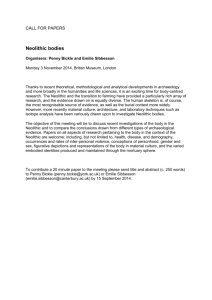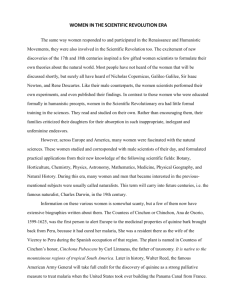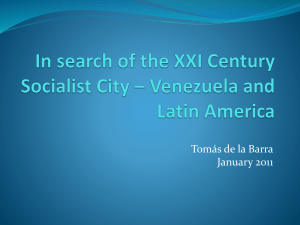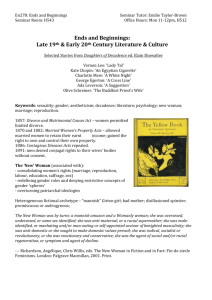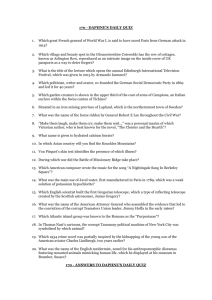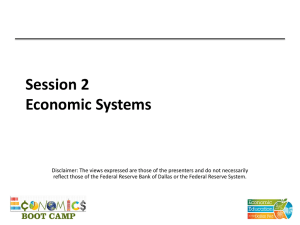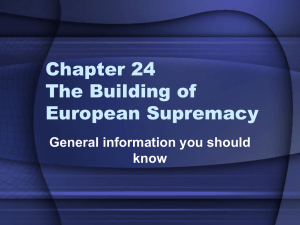Emilie Claeys - International Institute of Social History
advertisement
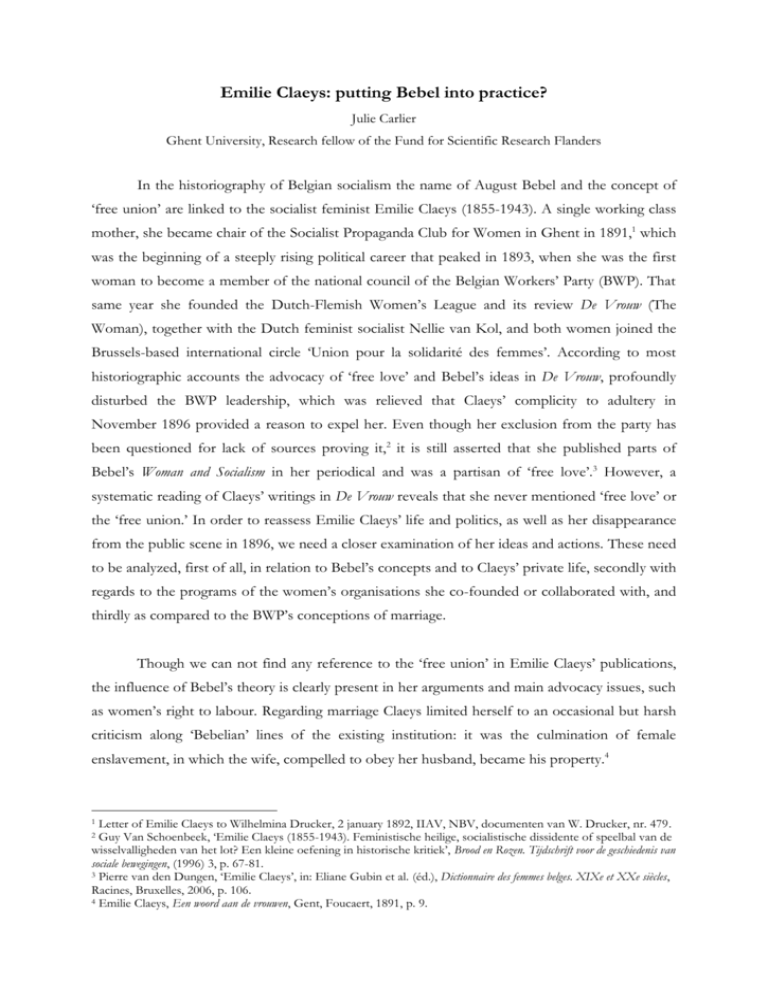
Emilie Claeys: putting Bebel into practice? Julie Carlier Ghent University, Research fellow of the Fund for Scientific Research Flanders In the historiography of Belgian socialism the name of August Bebel and the concept of ‘free union’ are linked to the socialist feminist Emilie Claeys (1855-1943). A single working class mother, she became chair of the Socialist Propaganda Club for Women in Ghent in 1891,1 which was the beginning of a steeply rising political career that peaked in 1893, when she was the first woman to become a member of the national council of the Belgian Workers’ Party (BWP). That same year she founded the Dutch-Flemish Women’s League and its review De Vrouw (The Woman), together with the Dutch feminist socialist Nellie van Kol, and both women joined the Brussels-based international circle ‘Union pour la solidarité des femmes’. According to most historiographic accounts the advocacy of ‘free love’ and Bebel’s ideas in De Vrouw, profoundly disturbed the BWP leadership, which was relieved that Claeys’ complicity to adultery in November 1896 provided a reason to expel her. Even though her exclusion from the party has been questioned for lack of sources proving it,2 it is still asserted that she published parts of Bebel’s Woman and Socialism in her periodical and was a partisan of ‘free love’.3 However, a systematic reading of Claeys’ writings in De Vrouw reveals that she never mentioned ‘free love’ or the ‘free union.’ In order to reassess Emilie Claeys’ life and politics, as well as her disappearance from the public scene in 1896, we need a closer examination of her ideas and actions. These need to be analyzed, first of all, in relation to Bebel’s concepts and to Claeys’ private life, secondly with regards to the programs of the women’s organisations she co-founded or collaborated with, and thirdly as compared to the BWP’s conceptions of marriage. Though we can not find any reference to the ‘free union’ in Emilie Claeys’ publications, the influence of Bebel’s theory is clearly present in her arguments and main advocacy issues, such as women’s right to labour. Regarding marriage Claeys limited herself to an occasional but harsh criticism along ‘Bebelian’ lines of the existing institution: it was the culmination of female enslavement, in which the wife, compelled to obey her husband, became his property.4 Letter of Emilie Claeys to Wilhelmina Drucker, 2 january 1892, IIAV, NBV, documenten van W. Drucker, nr. 479. Guy Van Schoenbeek, ‘Emilie Claeys (1855-1943). Feministische heilige, socialistische dissidente of speelbal van de wisselvalligheden van het lot? Een kleine oefening in historische kritiek’, Brood en Rozen. Tijdschrift voor de geschiedenis van sociale bewegingen, (1996) 3, p. 67-81. 3 Pierre van den Dungen, ‘Emilie Claeys’, in: Eliane Gubin et al. (éd.), Dictionnaire des femmes belges. XIXe et XXe siècles, Racines, Bruxelles, 2006, p. 106. 4 Emilie Claeys, Een woord aan de vrouwen, Gent, Foucaert, 1891, p. 9. 1 2 Could it be that Emilie Claeys never advocated the ‘free union’, because she could not conceive of herself being married, under whatever form that might have been? We can find traces of an anti-masculine stance in her writings, often attributed to the fact that she had been abandoned by the father of her children, but to Claeys herself it is especially her independence both as a woman and a mother that seems to have been crucial. Looking back on her relationship with the ‘bourgeois’ father of her daughters she claims not to regret it, for otherwise “it would have been almost certain [she] would have married a working class man, had a house full of children, and perished in the daily rut.”5 As a single mother struggling to get by, Emilie Claeys did not share Bebel’s liberal views on sexuality. She preferred moral restraint and considered the sexual impulse to be a ‘plague’ for humanity.6 Another crucial difference between Claeys’ and Bebel’s position is the relationship between socialism and feminism underlying their analysis. In Woman and socialism class prevails over gender and the equality between women and men is deferred to the future socialist society. Claeys, however, advocated women’s emancipation in the present. As I will argue further on, this conflict is quintessential to her position within the BWP. Within the women’s organization Claeys co-founded, the ‘free union’ was no main advocacy issue either. The platform of the Dutch-Flemish Women’s League makes little reference to marriage law.7 The explicit division of labour in the editorship of De Vrouw8 reveals that the ‘free union’ was not considered to be of immediate importance to their intended working class readers: Emilie Claeys wrote about matters direct relevance and never mentioned the ‘free union’, while Nellie van Kol, providing more intellectual contributions, did. However, in her extensive review of Woman and Socialism van Kol did not refer to Bebel’s conception of marriage as a strictly private agreement between two equals, but advocated a trial marriage of one year in which some external control would still be present. Before the middle and upper class audience of the ‘Union pour la solidarité des femmes’ Nellie did defend the ‘free union’.9 Contrary to the working class organisation founded by Claeys and van Kol, the program of this ‘bourgeois’ socialist association, placed a strong emphasis on marriage reform. It included for instance the demand for the suppression of any formality of the Civial Code that hindered the prompt conclusion of marriage, Letter from Emilie Claeys to Nellie van Kol, January 29, 1909, IIAV, Nellie van Kol archives, n° 3. Hedwige Peemans-Poullet, ‘Le contrôle des naissances chez Emilie Claeys: féminisme ou néo-malthusianisme ?’, in: Denise Deweerdt (ed.), Gender and Class in the 20th Century. Inaugural session of the international seminar “Socialism and Sexuality”, Gent, Amsab-MIAT, 2000, 98 and p. 101. 7 De Redactie, ‘Beginselverklaring van den Hollandsch-Vlaamschen Vrouwenbond’, De Vrouw, vol. 1, n°1, p.1 8 Nellie, ‘Een woord aan de vrouwen’, De Vrouw, vol.1, n° 2, August 15, 1893, p. 2. 9 Nellie, ‘Union pour la solidarité des femmes’, La revendication des droits féminins, vol. 1, n° 8, May 20, 1893, p. 118-124. 5 6 a suppression of adultery as a criminal offence.10 The ‘free union’ was not mentioned, since it was considered to be a “controversial issue that [would] most probably only be resolved half a century from [then].” 11 To these intellectual and middle or upper class women in the margin of the BWP the ‘free union’ was mostly an aspect of the future socialist society, even though they did not disapprove of the individual choice to engage in a ‘free union’ as an alternative to the existing form of marriage. Reviewing Woman and Socialism the prominent socialist Louis Bertrand wrote that concerning the ‘free union’ he did not want to choose sides, “for […] the economic transformation of society [would] […], induce other transformations […] that [would] render humanity happier and freer.”12 This ambivalence and hesitation is symptomatic of the Belgian socialists’ opinion on marriage and sexuality in general, closely linked to the party’s stance on the women’s question. In theory the BWP advocated equal rights for women from the 1890s onwards. In practice however, the majority within the party held very traditional gender views and women’s rights were everything but a priority, which meant that different and conflicting views could coexist. On the one hand for Alphonse Octors the reintroduction of the woman into the household was the ultimate socialist goal.13 On the other hand, Jules Destrée could advocate far-reaching feminist reforms, of which the pinnacle would be the ‘free union’: a “union of affection” that would replace the “union by the law.”14 The pragmatism of the working-class oriented Ghent section, where Emilie Claeys developed her activism, is a far cry from Destrée’s intellectual socialism. In its newspaper Vooruit ‘free union’ was equated to ‘free love’ and associated with animal behaviour and adultery. The socialist reaction to the public scandal surrounding Claeys’ complicity to adultery showed their general unease and reserve when it came to alternative views on marriage and sexuality. Their adversaries claimed that Claeys had put Bebel’s theory on ‘free love’ into practice. Vooruit replied that only Bebel himself and not socialism in general could be held accountable for his ideas; that Bebel never thought of preaching ‘free love’ under the prevailing conditions; and that many socialists were entirely hostile to his theory.15 Circular of the ‘Union pour la solidarité des femmes’, IIAV, NBV, documents of Wilhelmina Drucker, n°459. Letter of E. La Nauze to Louis Frank, June 13, 1894, KBR, Manuscripts, Papiers Frank, II/7793, n° 1. 12 Louis Bertrand, ‘La femme’, Le Peuple, June 31, 1891. 13 Alphonse Octors, ‘Les ouvrières industrielles’, Le Peuple, November 22, 1892. 14 Jules Destrée, Le socialisme et les femmes, Bibliothèque de propagande socialiste, Le Peuple, 1897, p. 15. 15 ‘Vrije liefde’, Vooruit, November 16, 1896. 10 11 In Emilie Claeys’ life the personal was political in many ways. Her personal experience as a working class single mother was a driving force for her political activism, but her private life was also what led to her downfall. In October 1896 a catholic newspaper accused her of complicity to adultery and a month later she was caught in the act. Vooruit immediately removed her as publisher of the newspaper. Even though there is no proof of her alleged exclusion from the BWP, there is no denying that she got caught in an already longstanding battle over moral respectability between socialists, Catholics and liberals. The former accused the latter of debauchery and perversion and the latter accused the former of advocating sexual freedom, mutual incriminations that were constantly reiterated regarding the ‘Emilie Claeys affair’. Like other 19th century women activists Claeys was the victim of an investigation into her private life in an effort to undermine her public authority. “The red virgin of Ghent”16 she was called, an ironic reference to the allegedly sexually deviant Louise Michel. Emilie Claeys was not only a socialist and feminist activist she had also stepped out of bounds by being an unwedded mother. For Vooruit this was not an issue, since she thus even embodied the socialist topos of the poor working class girl, seduced and abandoned by a careless bourgeois man. When the accusation was proven, socialist papers admitted she had made a mistake, but showed pity for her.17 It seems that Claeys’ problems with the BWP were bigger than the BWP’s issues with Claeys. Emilie Claeys is exemplary of those socialist feminists who were troubled by the ‘masculinism’ of the socialist movement.18 From the beginning of her political career, she questioned the good intentions of her male colleagues when it came to women’s rights. 19 She felt increasingly frustrated with the fact that her voice remained unheard by the party leadership and resigned from the National Council in 1895. That same year her writings disappeared from the pages of De Vrouw, most probably due to illness.20 In the context of a mental and physical “militant burn-out”,21 the fact that Emilie’s name was publicly besmeared triggered her complete retirement from public life. When Emilie Claeys engaged in a relationship with a married man, she was not putting Bebel into practice as a conscious ideological choice. Even though Woman and Socialism was a ‘La vierge rouge de Gand’, Le Bien public, October 6, 1896. ‘Verrotting omhoog !’, Vooruit, November 12, 1896; Alice Bron, ‘Emilie Claeys’, Le Peuple, November 14, 1896. 18 Karen Offen, European Feminisms 1700-1950. A Political History, Stanford, Stanford UP, 2000, p. 169. 19 Letter of Emilie Claeys to Wilhelmina Drucker, January 2, 1892, IIAV, NBV, documenten van W. Drucker, n° 479. 20 Nellie, ‘Opvoeding’, De Vrouw, vol. 3 n° 7, October 12, 1895; Alice Bron, ‘Emilie Claeys’, Le Peuple, November 14, 1896. 21 Guy Van Schoenbeek, ‘Emilie Claeys (1855-1943) …’, p. 80. 16 17 theoretical source of inspiration that enabled Claeys to translate her own life experience into political activism, she did not advocate the ‘free union’. Even the partisans of this alternative form of marriage, who represented a marginal, mostly intellectual and upper class current in Belgian socialism, generally deferred the realization of the ‘free union’ to the future socialist society. To be able to assess Claeys’ history within the BWP we have to look at the bigger picture: the relationship between feminism and socialism. Here the BWP and Bebel are sparring partners privileging class over gender and postponing women’s emancipation. Emilie Claeys’ was a voice crying in the wilderness, having to struggle against social-democratic ‘masculinism.’ Her feminism was probably not so much disturbing to the Belgian socialists as it was irrelevant.

